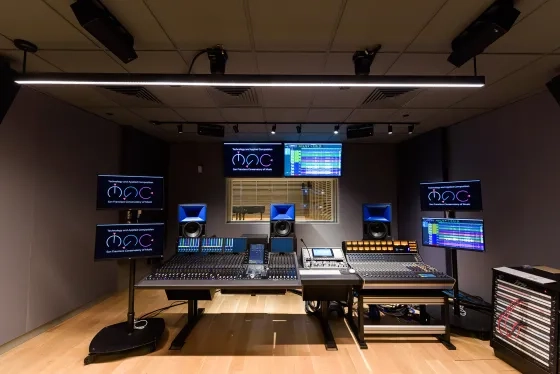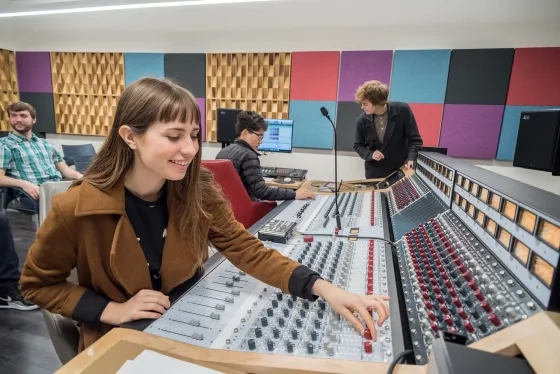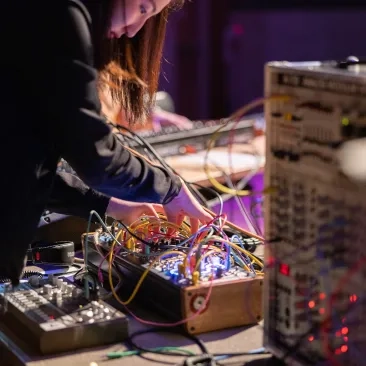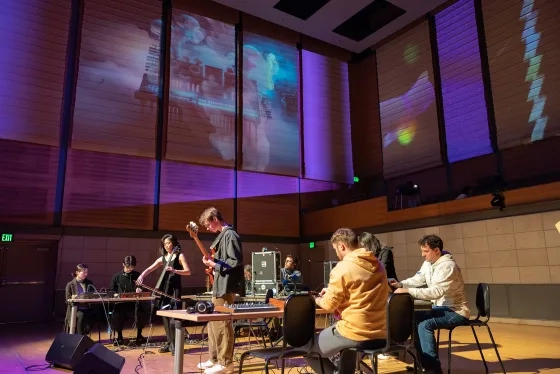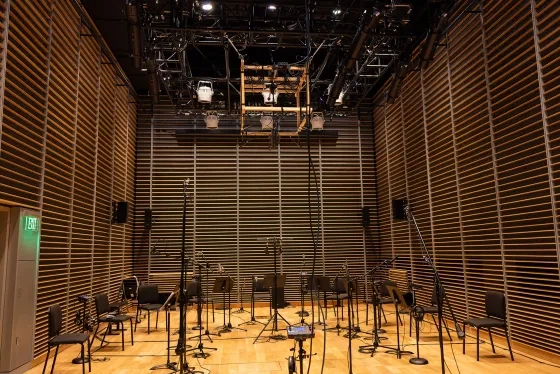No Boundaries! Film and Game Scoring Program Expands Opportunities For Success
News StoryNew courses, pathways, amplify opportunities for Technology and Applied Composition students, preparing them for future careers in a variety of fields from film and game scoring, to emerging media, spatial audio mixing, and more.
The San Francisco Conservatory of Music (SFCM) is pleased to announce a bold and exciting expansion of its Technology and Applied Composition (TAC) Program. Starting in Fall 2024, the program will see an additional seven course options added to the curriculum. Building on this enterprising and dynamic classroom experience, once students enter their junior year, they have the option to choose an educational track to specialize in, including Film Scoring, Game Scoring and Composer-Performer within the Bachelor of Music TAC program.
"The TAC program was already strong and robust," Steven Horowitz, Executive Director of the TAC program, said. "We have only added more progression and professional development for our students," he added. New courses cover, but are not limited to, topics such as Audio for AR/VR, Advanced Production Techniques, and classes in music and sound for games, film, as well as the history, culture and social impact of visual media.
These new courses and pathways, increase opportunities for Technology and Applied Composition students, preparing them for future careers in a variety of fields from film and game scoring to emerging media such as, AR/VR, AI, spatial audio mixing and more. "My hope is that students will learn who they are and how best to harness their individuality and creative expression into whatever field they choose to pursue after graduation," Horowitz added.
SFCM's TAC program gives students a direct path into the worlds of film and video game scoring, sound design, popular music production, artist development, and other rewarding musical avenues.
"What excites me about the new course options is primarily the expansion of the game audio curriculum," said current TAC student Joaquin Castillo ('27). "I'm very excited to learn about the ins and outs of Middleware, learn more about the history and culture of game audio, and most importantly, get the opportunity to contribute to the sound for actual games through the Game Audio Co-Lab."
In addition to new courses, classes have been streamlined to cater to students' interests. The first two years of the Bachelor of Music Technology and Applied Composition program comprise foundational studies, providing students with a comprehensive set of skills in digital audio workstations and Recording Studio Techniques, everything from music composition and sound design to studio production and implementation.
After two years in the program of developing essential skills, students begin intensive private instruction and can identify a TAC track to further hone their experience in a specific area. In their third year they have the option to specify a specific pathway into Film Scoring, Game Scoring, and Composer-Performer.
The Composer-Performer Track is an innovative program that pushes the boundaries of music creation by seamlessly integrating singer-songwriting, advanced technology, and abstract sound design. "This track is designed for musicians eager to explore new technologies in their instrumental performance practice and embrace the intersection of diverse genres and pioneering sonic landscapes," Horowitz added. "From building your own instruments and plug-ins to sound walks and interactive audio installations, Composer-Performer opens up a new world of sonic possibilities."
"I'm looking forward to the Game Scoring track in particular, but the other two are still exciting," Castillo said. "I can't wait to see what kind of music my peers from each track will make and I think that the optional course tracks are a great way to expand the breadth of the TAC curriculum without being too overbearing," he added.
"I am so thrilled," student Theo Popov said of the changes, calling it a "musical playground" where students can stay in an area of music making that interests them while benefiting the most from Conservatory training, "A film composer can study synthesis and noise, a singer-songwriter can learn to do state-of-the-art recording and editing, and a game music creator can play around with the impressive collection of synthesizers TAC owns."
Each of these tracks is designed to prepare students interested in these career paths with specific courses to help them further develop the creative and technical knowledge required to enter the field. The courses include high-level hands-on projects and co-labs with SONY, Dolby and others. "I believe the TAC program is unique and unparalleled in our creative and technical offerings," Horowitz said.
Learn more about studying Technology and Applied Composition.
